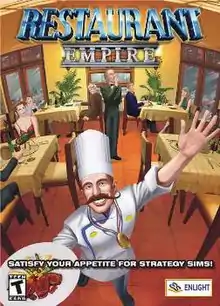Restaurant Empire
Restaurant Empire (simplified Chinese: 奇迹餐厅; traditional Chinese: 奇蹟餐廳; pinyin: Qí Jì Cān Tīng) is a 2003 business simulation video game created by Trevor Chan. Developed and published by Enlight Software for Microsoft Windows, the player owns, designs, and operates a restaurant.
| Restaurant Empire | |
|---|---|
 North American cover art | |
| Developer(s) | Enlight Software |
| Publisher(s) | Enlight Software |
| Designer(s) | Trevor Chan |
| Programmer(s) | Eddy Chan Gilbert Luis |
| Artist(s) | Anthony Ferrandiz |
| Platform(s) | Microsoft Windows |
| Release | |
| Genre(s) | Business simulation |
| Mode(s) | Single-player |
Gameplay
The player assumes the role of Armand LeBoeuf, a young chef who has recently taken over his uncle's restaurant. As the new owner, the player makes decisions on the kind of cuisine the restaurant serves (American, French, or Italian), what specific dishes go on the menu, and the staffing from the chef on down to the waiters, among other things. The ultimate goal of the game is to keep guests happy and make money at the same time.[2]
The main gameplay mode features some story details and periodic minigames to flesh out the simulation.[2] There is also a sandbox mode, which is basically freeform. Sandbox play removes many of the limitations the player faces in the main story mode, but there are no challenges either.[3]
Plot
In the game, a global culinary conglomerate, Omnifood, controls over 60% of the world's restaurants and is rapidly growing. The player must compete against Omnifood.[4]
The player takes the role of Armand LeBeouf, a recent graduate from a French culinary school given the opportunity by his uncle to run his own restaurant. Later, the player is given the opportunity to attract investment capital and open more restaurants.
Reception
| Aggregator | Score |
|---|---|
| Metacritic | 76/100[5] |
| Publication | Score |
|---|---|
| Computer Games Magazine | |
| Computer Gaming World | |
| Game Informer | 6.75/10[8] |
| GameSpot | 7.7/10[9] |
| GameSpy | |
| IGN | 7.8/10[11] |
| PC Gamer (US) | 79%[12] |
The game received "generally favorable reviews" according to the review aggregation website Metacritic.[5] It was criticized for its poor soundtrack, blurry textures, and blocky character models, but praised for overall good gameplay.[2]
Sequel
Enlight produced a sequel, Restaurant Empire II. Game publisher Paradox Interactive signed an agreement with Enlight to bring the game to stores in North America. The game's release was delayed over six times; it was finally released on May 26, 2009.
The new game has several new features, including the addition of German cuisine, as well as the city of Munich as a location for the player to expand his restaurant chain.
References
- "Enlight Signs Exclusive North American Distribution Deal with Activision Value Publishing". enlight.com. February 18, 2003. Archived from the original on April 13, 2003. Retrieved September 29, 2022.
- Butts, Steve (27 May 2003). "Restaurant Empire". ign.com. Retrieved 28 May 2023.
- "Trevor Chan's Restaurant Empire Review". gamewatcher.com. 12 August 2003. Retrieved 29 May 2023.
{{cite web}}:|first=missing|last=(help) - Adams, Dan (26 February 2003). "Restaurant Empire". ign.com. Retrieved 29 May 2023.
- "Trevor Chan's Restaurant Empire for PC Reviews". Metacritic. CBS Interactive. Retrieved July 13, 2019.
- "Restaurant Empire". Computer Games Magazine. No. 152. theGlobe.com. July 2003. p. 80.
- Jongewaard, Dana (June 2003). "Restaurant Empire". Computer Gaming World. No. 227. Ziff Davis. p. 85.
- Brogger, Kristian (July 2003). "Restaurant Empire". Game Informer. No. 123. GameStop. p. 120.
- Colayco, Bob (April 11, 2003). "Restaurant Empire Review". GameSpot. CBS Interactive. Retrieved July 13, 2019.
- Rausch, Allen (May 6, 2003). "GameSpy: Restaurant Empire". GameSpy. IGN Entertainment. Retrieved July 13, 2019.
- Butts, Steve (May 27, 2003). "Restaurant Empire". IGN. Ziff Davis. Retrieved July 13, 2019.
- Humphries, Scott (July 2003). "Restaurant Empire". PC Gamer. Vol. 10, no. 7. Future US. p. 81.